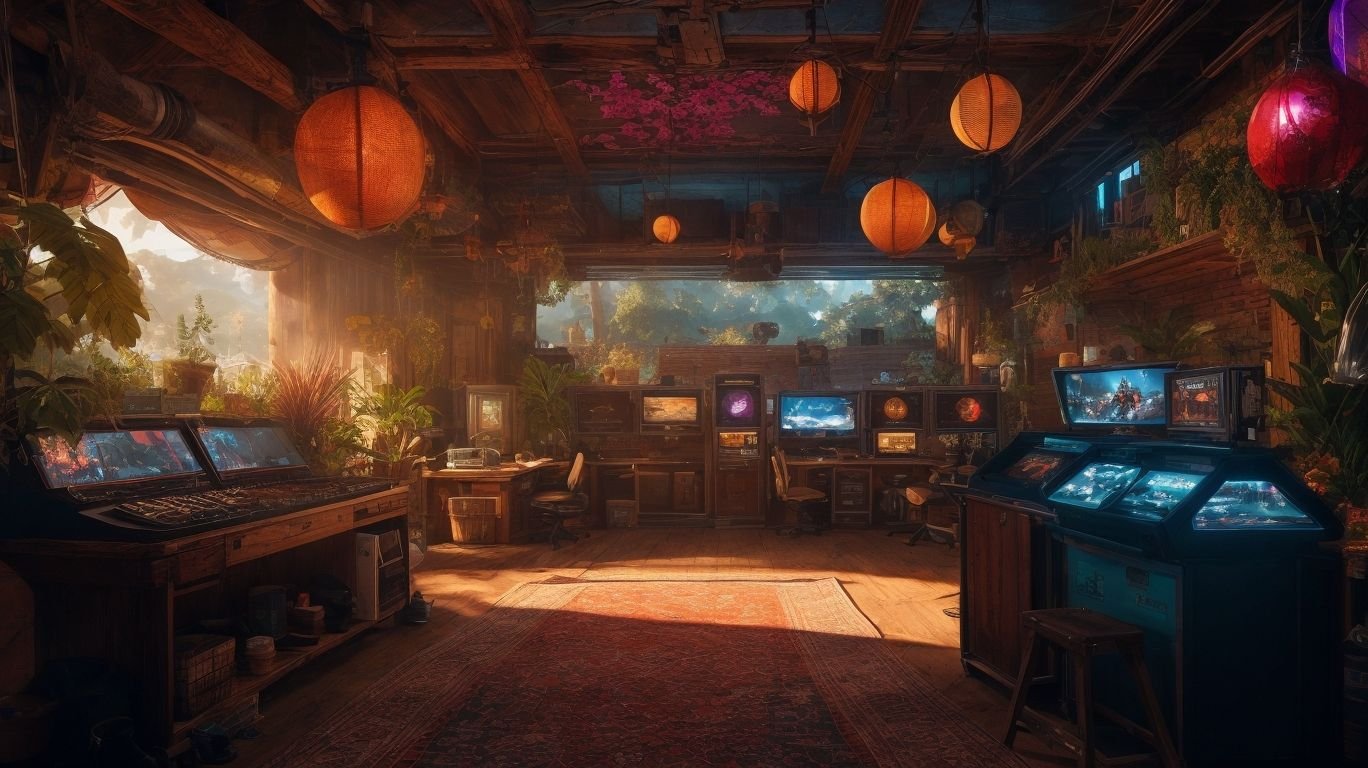Table of Contents
ToggleGaming background refers to the history, evolution, and impact of the gaming industry on society. It encompasses the various forms of gaming, including video gaming, online gaming, and mobile gaming. Gaming has become an integral part of modern entertainment, with a diverse audience ranging from casual players to professional gamers.
The history of gaming can be traced back to the 1950s when the first computer games were created. However, the early beginnings of gaming can be seen in the 1940s with the invention of the Cathode Ray Tube Amusement Device, which is considered the first electronic game.
The evolution of gaming consoles has played a significant role in the growth of the gaming industry. From the Magnavox Odyssey, the first home video game console, to the modern consoles like PlayStation and Xbox, gaming technology has advanced significantly.
The introduction of online gaming in the 1990s revolutionized the gaming industry, allowing players to connect and play with others online. This paved the way for the rise of massively multiplayer online (MMO) games and the creation of online gaming communities.
The impact of gaming on society has been a topic of debate. On one hand, gaming has been shown to have positive effects on cognitive skills, problem-solving, and social connections. On the other hand, excessive gaming has been linked to negative effects such as addiction and isolation.
The gaming industry has grown exponentially over the years, with a global market value of over $159 billion in 2020. The rise of esports, which is competitive gaming at a professional level, has played a significant role in this growth. The influence of mobile gaming, with the rise of smartphones and tablets, has also contributed to the industry’s expansion.
The future of gaming looks promising, with advancements in technology such as virtual reality (VR) and augmented reality (AR) creating immersive gaming experiences. The industry is also constantly evolving to cater to the changing demands and preferences of gamers.
Some popular gaming genres include:
- action and adventure games, which involve fast-paced gameplay and storytelling
- role-playing games (RPGs), which allow players to create and customize their characters
- sports and racing games, which simulate real-life sports and racing events
- strategy games, which require critical thinking and decision making
As the industry grows, new and innovative genres continue to emerge, catering to the diverse interests of gamers worldwide.
Key Takeaways:
- Gaming background refers to the history and evolution of gaming, from its early beginnings to the rise of online and mobile gaming.
- Gaming has had a significant impact on society, with both positive and negative effects on individuals and communities.
- The gaming industry has experienced immense growth, with the rise of esports and the influence of mobile gaming shaping the future of the industry.
What is Gaming Background?

Photo Credits: Benzinggaming.Com by Paul Martin
Gaming background is the collective history, experience, and knowledge of a player in the gaming world. It includes the games they have played, their level of skill, and their understanding of gaming mechanics and strategies. A gaming background can be varied, as players may have expertise in different genres and platforms. It impacts a player’s decision-making, problem-solving skills, and overall performance in games. Knowing one’s gaming background is essential when participating in competitive gaming or discussing gaming preferences and interests with others. It fosters a sense of community and enhances the overall gaming experience.
History of Gaming

Photo Credits: Benzinggaming.Com by Steven Garcia
Gaming has come a long way since its inception, evolving from simple pixelated graphics to immersive virtual worlds. In this section, we will take a trip down memory lane and explore the history of gaming. From the early beginnings of gaming to the introduction of online gaming, we will trace the evolution of this popular form of entertainment. Get ready to revisit the nostalgia of old-school games and discover how gaming has transformed into the multi-billion dollar industry it is today.
Early Beginnings of Gaming
The early beginnings of gaming can be traced back to the 1940s and 1950s when computer scientists and researchers began experimenting with simple electronic games. These games were often text-based and played on large mainframe computers. One of the earliest known computer games was “Nim,” created in 1940 by British mathematician Alan Turing. It involved two players taking turns removing objects from a pile.
As technology advanced, so did the complexity and popularity of games. The 1970s saw the rise of arcade games like Pong and the first home gaming console, the Magnavox Odyssey. These early games paved the way for the multi-billion dollar gaming industry we know today.
Fun fact: Did you know that the first video game tournament was held at Stanford University in 1972?
Evolution of Gaming Consoles
The journey of the evolution of gaming consoles has been a captivating one, characterized by continuous innovation and technological advancements. From its modest beginnings with the Magnavox Odyssey in 1972 to the state-of-the-art and immersive gaming systems of today, the gaming console industry has undergone significant transformations. Companies such as Nintendo, Sony, and Microsoft have played crucial roles in shaping the landscape of gaming consoles. The introduction of features like online multiplayer, motion controls, and virtual reality has completely transformed the gaming experience. With the ever-increasing demand for more realistic graphics and immersive gameplay, the future of gaming consoles holds the promise of even more exciting and groundbreaking developments.
Introduction of Online Gaming
The emergence of online gaming has brought a revolution in the gaming industry, providing players with the ability to connect and compete with others around the world. This advancement has expanded gaming communities and opened up new opportunities for social interaction and collaboration. Popular online gaming platforms such as Xbox Live and PlayStation Network have paved the way for multiplayer experiences, allowing gamers to team up or challenge each other in a variety of genres. With the increasing availability of high-speed internet, online gaming continues to grow at an exponential rate, fueling the development of esports and contributing to the rise of a global gaming culture. In fact, it is projected that online gaming revenue will reach $196 billion by 2022.
Impact of Gaming on Society

Photo Credits: Benzinggaming.Com by Walter Johnson
As gaming continues to grow in popularity, it is important to examine its impact on society. While some may argue that gaming has negative effects, others argue that it has positive effects as well. In this section, we will explore both sides and discuss the impact of gaming on society. First, we will discuss the potential positive effects of gaming, such as improving cognitive skills and promoting social interaction. Then, we will address the potential negative effects, such as addiction and violence, that have raised concerns about the impact of gaming on society.
Positive Effects of Gaming
Gaming has been proven to have various positive effects on individuals and society. It has the ability to improve cognitive skills like problem-solving, critical thinking, and decision-making. Gaming also enhances hand-eye coordination and reaction time. Moreover, it can promote social connections through multiplayer games, encouraging teamwork and communication. Research has demonstrated that gaming can also decrease stress levels and enhance mood by providing a captivating and immersive escape. Furthermore, gaming has been utilized for educational purposes, with games specifically designed to teach different subjects.
Negative Effects of Gaming
While gaming can be an enjoyable activity, it’s important to be aware of the potential negative effects it can have:
- Increased sedentary behavior: Spending long hours gaming can lead to a sedentary lifestyle, contributing to health issues like obesity and cardiovascular problems.
- Social isolation: Excessive gaming can lead to reduced social interaction and isolation from real-life relationships.
- Impaired sleep: Gaming late into the night can disrupt sleep patterns, leading to fatigue, decreased concentration, and poor academic or work performance.
- Aggressive behavior: Some studies suggest a correlation between violent video games and increased aggression, although other factors also play a role in aggressive behavior.
- Addiction: Gaming addiction can negatively impact mental health, relationships, and daily functioning, causing individuals to neglect other responsibilities and interests.
How Has Gaming Industry Grown?

Photo Credits: Benzinggaming.Com by Andrew Adams
The gaming industry has undergone significant growth over the years, becoming a multi-billion dollar market that continues to expand. In this section, we will explore the various factors that have contributed to this growth. From the rise of esports and its impact on the industry to the increasing popularity of mobile gaming and its influence, we will take a closer look at the evolution of gaming. Additionally, we will also consider the future of gaming and how it is expected to continue to thrive in the years to come.
Rise of Esports
The growth of esports has been a significant development in the gaming industry. Esports, or competitive video gaming, has gained immense popularity, attracting millions of viewers and generating substantial revenue. It has even begun to rival traditional sports in terms of viewership and prize money. Major esports events are now broadcasted globally, with dedicated arenas and teams.
The rise of esports has also led to the professionalization of gaming, creating new career opportunities for players, coaches, commentators, and event organizers. The future of esports is promising, with continued growth and expansion expected.
error
Future of Gaming
The future of gaming is full of promise, thanks to advancements in technology and its increasing popularity. Virtual reality (VR) and augmented reality (AR) are poised to completely transform the gaming experience by immersing players in realistic and interactive virtual worlds. The rise of cloud gaming also allows players to stream games without the need for high-end hardware. In addition, the industry is witnessing the rapid growth of esports, with competitive gaming becoming a global phenomenon. As the gaming industry continues to evolve, it is crucial for developers to prioritize accessibility, inclusivity, and sustainability. In the coming years, we can anticipate gaming to become even more immersive, social, and diverse, making for an exciting future of gaming!
Popular Gaming Genres

Photo Credits: Benzinggaming.Com by Aaron Hall
There are numerous popular gaming genres that cater to various preferences and interests. Some of the most well-known gaming genres include:
- Action: Fast-paced games that involve combat, exploration, and adrenaline-pumping gameplay. Examples include Call of Duty and Grand Theft Auto.
- Role-playing: Immersive games that allow players to assume the role of a character and embark on quests and adventures. Popular RPGs include The Elder Scrolls series and Final Fantasy.
- Sports: Games that simulate real-life sports, allowing players to compete in virtual tournaments and championships. Popular sports games include FIFA and NBA 2K.
- Strategy: Games that require strategic thinking and planning, often involving resource management and tactical decision-making. Popular strategy games include Civilization and StarCraft.
- Adventure: Story-driven games that focus on exploration and puzzle-solving. Popular adventure games include The Legend of Zelda and Uncharted.
When selecting a game, take into account your preferences for gameplay mechanics, storytelling, and overall experience. Whether you enjoy action-packed battles, immersive narratives, or strategic challenges, there is a gaming genre that will suit your taste.
For additional recommendations, explore indie games for unique and innovative experiences, or try out multiplayer games for social interaction and competition. Happy gaming!
Frequently Asked Questions
Can gaming background images be used for professional purposes?
Yes, gaming background images are suitable for professional use, such as virtual meetings or presentations. They can add a creative and unique element to online content and help establish a strong brand image.
Are there different types of gaming background images available?
Yes, there is a variety of gaming background images available, including designs suitable for different content and themes. They can be used for gaming, vlogging, educational videos, and more.
Can gaming background images be customized or personalized?
Yes, gaming background images can be customized and personalized to suit individual preferences. They can help create a unique and professional image for individuals or brands.
Are gaming background images suitable for different devices and screen sizes?
Yes, gaming background images are suitable for various platforms and devices, such as Zoom, Twitch, YouTube channels, and personal computers and phones. They are also designed to fit different screen sizes for a seamless viewing experience.
What regions are available for users on Adobe Stock to search for gaming background images?
Adobe Stock offers regions such as North America, South America, and Europe, Middle East, and Africa. Under these regions, there are options for specific countries, such as the United States, Canada, Venezuela, Algeria, Israel, Italy, and Kenya.
How many results are available on Adobe Stock for the search term ‘gamer background’?
As of now, there are 153,291 results for the search term ‘gamer background’ in the images category on Adobe Stock. With the new filters available, users can refine their search for more specific and relevant results.
